#or if it does if it still occupies the place in history that it does IRL. since the piper kind of replaces it
Explore tagged Tumblr posts
Text
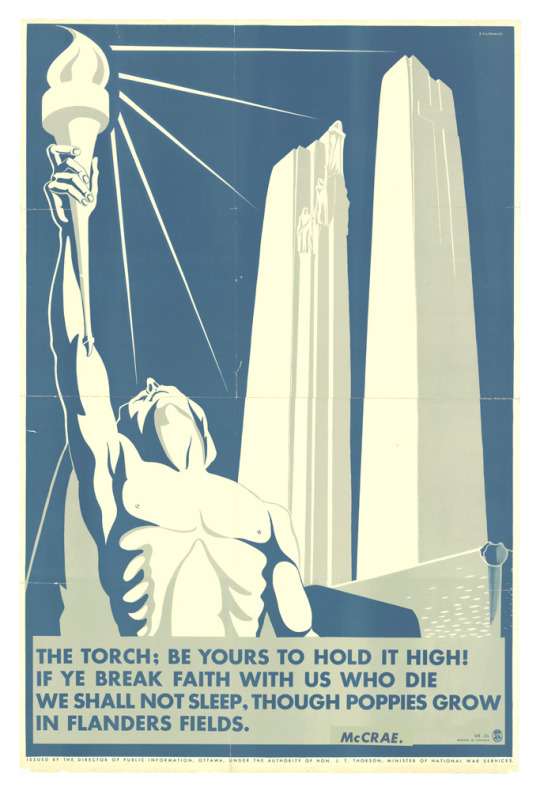
wwii era poster featuring "in flanders fields" and the wwi vimy memorial
#fic ramblings#anne of green gables#how certain the journey#come back home#getting to a Certain Part in hctj and am having Thoughts#when writing abt walter's poetry career i often kinda sub in “the piper” wherever i see “in flanders fields” used#since it's clearly meant to evoke IFF or even BE it#which makes me wonder if IFF even exists in the aogg verse#or if it does if it still occupies the place in history that it does IRL. since the piper kind of replaces it#which kind of throws the poppy as a WWI symbol all out of whack too#in the aogg verse everyone wears pied piper pins on remembrance day#also sometimes i wrestle with 'would the piper/walter even be as famous if he didn't die young' but idk the answer to that yet
4 notes
·
View notes
Text
ft. logan howlett x f! reader — xmen, marvel
╰₊✧ giving you a piggyback ride after a date┊0.4k words
contains: fluff, established relationship, mentioned age gap & size difference
➤ author's note: a little short one before i finish the longer ones ^^

he’s gonna huff about how he told you to wear comfortable shoes and will roll his eyes when you insist that the heels you chose match better with your outfit, but he secretly loves it when you climb on his back and allow him to carry you home. maybe you’ll tease him about being unenthusiastic because you’ll hurt his back like the old man he is, giggling in surprise when he bounces you up a few times acting like he’ll throw you off if you misbehave.
with your strappy black heels in one hand and his barefoot lover on top of him, he’ll attract quite a few looks walking down the street (or at least, more than usual since it’s difficult not to notice him). it gives him a strange sort of pride. he frequently questions if he’s doing enough as your boyfriend when he struggles to express himself and has a long history of trauma that still hasn’t been fully exposed to keep you safe from the horror, but he knows for a fact that he’s doing this correctly, making sure that you don’t need to walk down the street limping from pain and discomfort and being strong enough to have you rest in his grasp.
if you weren’t blabbering on about whatever topic occupying your mind (he only grunts in response, but trust me that he’s listening to every word), fiddling with his swoopy hair tufts, and placing a gentle kiss anywhere that your lips could reach, he could have forgotten you were there since he barely feels your weight on him. perks of having an adamantium skeleton and being ripped as hell, but he does need to check in on you every now and then to ensure that you haven’t fallen off or something (it has happened once and he still hasn’t forgiven himself since then).
sure, he kinda looked like a scary guard dog with his rugged appearance, towering bulky frame, and general intimidating aura, but it just signals to everyone with eyes that you were taken and tells anyone who has the thought of having you as their own to ‘fuck off’.
the only thing about it that he hates is being unable to see your sparkling smile while you gawk at how different everything looks while at a higher height, yet the vision of it in his head makes his heart warm with adoration and affection.


#📜. her works#logan howlett#logan howlett x reader#wolverine#wolverine x reader#x men#x men x reader#marvel#marvel x reader#deadpool and wolverine#hugh jackman
1K notes
·
View notes
Text

Our second edition of the Black History Month Author Spotlight series features beloved author, C.C. Hill (@when-life-gives-you-lemons-if)!
(CC is an absolute institution. What better way to celebrate Valentine’s than by doing a feature of the slice-of-life romance queen herself? CC is one the most inspiring, supportive IF writers out there, and it was a great honor to pick her brain! Read on for pandemic-setting feel good stories and Creole-based spells!)
Author: C.C. Hill
I'm from Haiti, born and raised. I love red wine, ice cream, and I'm obsessed with true crime podcasts.
Games: When Life Gives You Lemons (Slice-of-Life)
Synopsis: You play as an MC starting a new life in a small town called Lemon. It’s a story about self-discovery, love, and parenthood—a comfort story where the love interests want to sweep you off your feet.
Games: The Midnight Saga (Horror)
Synopsis: After finding yourself trapped in another dimension, you and your friends must fight for survival and defeat the monsters that lurk in the shadows. Make sure to grab a weapon as your quiet Halloween night turns into an out-of-this-world adventure!
Quote from the interview:
What mostly inspired Lemon in particular was the need for a feel-good story—a story where the character just needs a break. No magic, no monsters, just going through life and having the romance options fall in love with them no matter what. It was just the need for comfort, for feel-good moments, for romance, and a little bit of drama.
Read on for the full interview!

Tell me more about yourself! What are some things new readers or long-time readers might not know about you?
I'm from Haiti, born and raised. I love red wine, ice cream, and I'm obsessed with true crime podcasts.
Can you tell me a bit about what you’re working on right now and your journey into interactive fiction? What inspired the game/story you’re currently writing?
I'm working on so many things it should be illegal for my brain to operate this way. But mainly, When Life Gives You Lemons. My plan is to focus on the final part in March, do some beta testing, and submit it to Hosted Games in April for my birthday month.
I'm also under contract with Heart’s Choice, writing Spices of the Heart, with hopes of completing it this year. On top of that, I’m working on publishing my first visual novel, The Wedding. It’s close to completion, and I have the third quarter of 2025 planned for publication.
I only started writing interactive fiction in 2020. When the pandemic hit, I needed something to keep my brain occupied, and five years later, I’ve published three games and still have a ton of projects in progress.What mostly inspired Lemon in particular was the need for a feel-good story—a story where the character just needs a break. No magic, no monsters, just going through life and having the romance options fall in love with them no matter what. It was just the need for comfort, for feel-good moments, for romance, and a little bit of drama.

How has your identity, heritage/background, upbringing, or personal experiences influenced your storytelling or writing process? OR How does your work feature aspects of your identity / experience?
My first game, The Midnight Saga, was heavily inspired by my background and where I'm from. The story itself is based on an old Haitian folklore about not staying outside after midnight—if you do, the Keeper of Midnight will eat you. I took that idea and built the characters around it.
I even managed to include some spells written in Haitian Creole. It was a lot of fun to write, and even though Book 2 is currently on hiatus, this story has a special place in my heart because it was my first game. The characters are a representation of my people and the struggles they’ve gone through. I’m really happy that it was my debut story.
What are some of the most rewarding or challenging aspects of writing Interactive Fiction for you?
For me, it’s branching and being able to write an MC and other characters in a way that readers can truly connect with. Lately, I’ve been writing a lot of feel-good romance and slice-of-life stories, and I’m starting to feel like this is my comfort zone—and I want to stay here forever.
I never want to create a romance option that is inherently bad or purposely deceitful. My biggest challenge is writing characters who are flawed and complex—where readers can love them or hate them—but making sure they aren’t just villains for the sake of it. They’re simply existing in the world they were created in.
What does your writing process look like? Any rituals or habits? Any tips, tricks, philosophies or approaches that have worked very well for you?
My writing process is a mess. My brain gets pulled in so many directions. When I get an idea, I have to code it, shape it, and give it life—otherwise, it’s going to bug me forever. That’s why I end up with so many WIPs. I need to see them through, at least to a short demo, to see if they make sense.
My desk is also full of notes, and I basically write on anything—pieces of napkins, tissue boxes, whatever is nearby. One weird habit I have is that some of the best changes I’ve made to my games, those "spark" moments, happen when I’m in the shower. It’s weird and strange, but it works.
What’re you excited to tackle/implement/work on next? Or anything you’re looking forward to in the year ahead?
Keep writing romance and feel-good slice-of-life stories. Get When Life Gives You Lemons published this year. Focus on doing this full-time. Publish my visual novel.
Overall, just stay busy and be productive.

If you were to say one thing to your readers, other authors, and/or the interactive fiction community: what would it be?
To the readers—us authors don’t have all the answers. Sometimes, we start writing a story and end up forgetting certain plots or characters, which is easy to do when writing interactive fiction. So yes, we often write ourselves into a corner and just put a period there so the story can progress.
To the authors—write stories you love, something you would want to read. It makes it easier to keep going because if it’s a story you love, you’ll want to see how it ends, and that will push you to persevere.
This-or-that segment: (red = CC's pick)
Coffee or tea?
Early mornings or late nights?
Angsty or Cozy romances?
Steady progress or frenzied binge-writing followed by periods of calm?
Introvert or extrovert?
Plotter or pantser?
#interactive fiction#author feature#black history month#game developer#interview#cc hill#wlgyl if#midnight saga if
431 notes
·
View notes
Note
What do you mean by antizionist?
I mean I'm against the Zionist movement, the ideas that became dominant in it, and what it did in practice as a result of those ideas.
Specifically, I'm pro-Palestine and I think we shouldn't hold onto lands we conquered after driving away other populations, including pre-48 borders. If a Palestinian family was driven away from Akka, or Akko, however you want to call it, they should get to return to it.
In theory, more broadly, it means I'm against the concept of a state that prioritizes and caters to a specific ethnic group. If you think "but there are other countries that do that," I'm not as familiar with their politics, I still think that's wrong, and I'm going to focus on the place where I was born because... this is where I live. I don't trust the idea of a country made to prioritize a specific ethnicity. I believe that even if there was "a land without a people for the people without a land" - which there wasn't, Palestine was already inhabited - there was never going to be a way to build a Jewish state without ending up with the oppression and marginalization of non-Jewish people.
It's not that I think Jewish people don't have the right to live in this land. If we came here as refugees and tried to seek coexistence with the local population, without the aim to build a country on top of their cities and villages, this might have been a very different story. There has always been Jewish immigration to Palestine on some level, and there was always a Jewish community living here. Long before the Zionist movement. So for me it's about how the Zionist movement replicated the methods and actions of colonialist movements, and used the British who were occupying it at the time to give us legitimacy when they never had the right to give away land that wasn't theirs. I don't think this can be excused just because we have cultural and historical ties to this land.
Even if Israel was conceived as a shelter, this started with us destroying whole communities because that's what conquering a land means, and it was always going to lead to more of the same. Self defense has been used as an excuse to harm other populations all throughout history. Either on the scale of war, like conquering and expanding to preemptively deal with the threat of sharing a border with another nation, or in internal politics, like mistreating immigrants, or like transphobes using the idea of safety to create laws that hurt trans people. Or even socially, without needing laws, like we also see happening with trans people.
Self defense is a concept that can be weaponized, and does get weaponized all the time. And over the past year and a half we used it to destroy Gaza, bomb and starve its population, make it essentially uninhabitable. And we still call it self defense.
Unless all human beings are equally prioritized, even "self defense" and the idea of shelter become weapons.
So I'm against the concept, beyond what it ended up doing in practice, because I don't see a way the Zionist movement could have achieved anything without destroying a population wherever it tried to start a country, and even without that initial population I don't see a way to create a state that prioritizes us without marginalizing non-Jews living among us.
We have a right to safety. Not to be an oppressive occupying force. I believe this path was always wrong to pursue.
258 notes
·
View notes
Text
The team learns about Peter's stress baking fairly quickly after he moves into the tower.
"Why does this place smell like cookies?" Tony asks suspiciously, "Pepper put an end to homemade care packages after that Cap incident."
Steve protests from the dining table. "Hey, that fan seemed totally normal. Y'know in my generation you do not mess with baked goods, that's sacred."
Natasha pats his back comfortingly as she joins the conversation.
"They came from the kid. They're actually pretty good, here."
Nat hands a still-warm cookie to Tony, who bites it curiously.
"Damn, it melts in my mouth like buttery ambrosia and still has a perfect crunch around the edges. Is that a nutty aftertaste?"
"Yes!" Peter yells from the other room, a clatter sounding before his head pokes around the wall, oven mitts still attached to his hands.
"I brown the butter, it really deepens the flavour!"
"Good on you kid. What's the occasion?"
Peter stutters, "uhhhh, no occasion. I just like cookies!"
He disappears around the corner again, and Tony sends a confused glance towards his teammates.
Steve shrugs his shoulders, mouth still full of cookie, and Natasha sends him an arched brow. Tony isn't sure what that means, but feels intimidated enough to exit the room anyway.
* * *
The baking lasts the rest of the week, until Peter comes home yelling, "I aced my calculus midterm!!!" running out of the elevator with a stapled set of papers in his hand.
"So no more baking?" Nat asks neutrally.
"Nope! Woohoo!"
Just like that the kid is gone, jumping down the hall towards his bedroom.
Tony looks at Nat quizzically.
"It was midterm week. He baked 3 dozen cookies, 2 types of muffins, and a cheesecake."
"So he stress bakes?"
"He stress bakes."
* * *
It becomes a "thing" in the tower.
Sam eats toast from freshly baked bread one morning while watching Bruce quiz Peter on his upcoming AP history test. Each slice is cut, toasted, and buttered to perfection by Peter while he explains sectionalism in the 20th century.
* * *
Bucky grates carrots while Peter mixes a bowl of dry ingredients furiously, the boy mumbling to himself non-stop.
"Has he gone insane?" Clint asks from the doorway.
"Spanish oral exam," Bucky replies.
"Ay caramba."
"Tal vez pueda sobornar a mi maestra con glaseado de queso crema..." Peter starts mumbling. (Maybe I can bribe my teacher with cream cheese frosting...)
Bucky and Clint share a concerned look.
Clint approaches the boy, "put down the spatula Pete, let's talk about this."
Peter looks up in alarm.
"In English! Just English!"
* * *
"What's up kid? It's spring break, what could you possibly be stressing about."
Today Tony walks into a full kitchen; Wanda, Natasha, and Pepper are occupying the space while Peter pours something creamy into a metal bowl.
"He's asking MJ out tonight, so he's making cookies and cream ice cream in case it goes wrong." Natasha crosses her arms when she replies to him, eyes focused on Peter's mixing.
"Does ice cream even count as stress baking? The very meaning of 'bake' is to put under heat. But I suppose it does feel wrong to call it cooking."
Peter looks up, his brown eyes large and sad like a baby cow, "I still baked the cookies from scratch."
"Yeah he's a real Nara Smith!" Wanda adds enthusiastically.
"Oookay... I'll pretend I know what that means. And since when do we have an ice cream maker?" Tony points to the fancy hardware out on the kitchen counter.
"Oh, I got that for him. We lacked a lot of the tools for basic baking recipes," Pepper informs him.
Tony ponders how ice cream machines count as a basic baking tool, and decides not to argue with three powerful women and their favourite lovesick teenager.
Peter picks up his bowl and moves it into the freezer, clearing away a couple frozen pizzas and a bag of peas.
"Should I even bother with the cones?" Peter asks with a pout.
"Pete she's gonna say yes! Also if you're wallowing in misery with a tub of ice cream we still want our cones so we can emotionally support you with a crunchy treat," Wanda says with a supportive smile.
The others nod along.
"You're right!" Peter agrees before turning around and grabbing an honest-to-god waffle cone maker, with the cone shaping kit to boot.
"Why..." Tony begins to protest, "y'know what, I don't care. Let me know how it goes kid."
The man is ignored as he moves through the kitchen to grab a banana, the women coaching Peter on his manners, flirting, and first date ideas as he exits the room.
* * *
Thor hums around the delicious treat.
"Mmm. You know young Peter, you could have a shop for your creations. Is there a Stark Industries for baked goods?" Thor asks the young lad, crumbs falling from his mouth as he chews the cookie bar.
"I didn't invent the blondie Thor. I was just trying to explain what it is, a cookie brownie! I did decorate them all by myself though," he says with a satisfied grin.
"Ah yes," Thor lifts up another blondie by the pretzel stick Peter put in the squares, attached with a bit of melted chocolate so they're shaped like Mjolnir, "now you are all worthy of the hammer. Ha! This is funny, I'm sure the others will find your talents equally amusing."
Peter picks up his own mini-Mjolnjr and waves it around, "it is I, son of Odin. Don't worry puny Midgardians, I will protect you with my mighty hammer and beautiful hair!"
Thor laughs thunderously at the impression, clapping.
Bruce walks into the room, enticed by the laughter.
"Ah! My friend, Peter has made edible Mjolnirs so you, too, may be worthy. It's delicious and hilarious. Imagine Banner wielding my hammer, ha! Ridiculous," Thor is all too amused by the situation.
Bruce gives Peter an offended look as Thor continues laughing with himself, the younger just shrugging. Bruce takes one of the treats anyways, pointedly not holding it by the pretzel stick.
"Y'know Pete, have you ever considered opening a bakery? You are quite talented. I think the Avengers alone would keep you in business," Bruce asks politely.
"Well I only like to bake when I'm stressed. That wouldn't be a very stable business model," Peter points out.
"True. Although running a business can be quite stressful, so maybe you'd have a continuous supply?"
"Hm. Efficient and unhealthy," Peter nods like it's the perfect plan.
"Wow you really are Stark's intern."
Thor bursts out into another bout of raucous laughter.
"Imagine Stark wielding my dessert hammer," Thor barely gets the words out, "Stark being worthy-AH HAHA."
Bruce and Peter share a look of wide-eyed alarm before joining in on the laughter.
They all share the moment before Bruce straightens up a bit to ask, "what are you even worried about anyways Peter?"
Peter wipes a tear from his eye, "I forgot to call Aunt May this morning like I always do and she only let me move here if I promised I wouldn't neglect her. So now I'm too scared to check my phone."
"I see," Bruce sympathizes.
"Yeah, baking is good for procrastinating. I pretend I'm being productive while also creating comfort food for after my breakdowns."
* * *
Tony steps into the dining room one afternoon to find Peter slicing apples while Steve sits across from him cutting intricate patterns into pie crust. There is an array of leaves and flowers set out on the flour-sprinkled table.
"So is the ornamentation necessary, or is Cap also developing a delicious self-soothing habit," Tony inquires.
"I was just talking to Peter about pie recipes from the 40s and he asked if I could help make his prettier," Steve smiles up at his companions, "it's actually a lot of fun, I can't say I've ever used food to make art before."
"He's a natural talent Mr. Stark!"
Tony agrees with the quirk of an eyebrow and cheeky sideways nod. He observes for a moment before asking something that's been bothering him recently.
"Pete, I gotta ask. Why baking? You inherited your Aunt's terrible cooking skills, and it's not like you're built for other domestic duties. Your room is a mess. What gives? How are you so... refined?"
Peter pauses his chopping to look up incredulously.
"It's science Mr. Stark. Baking is just chemistry! I'm great at chemistry," he says with a grin.
Tony thinks about it.
"Huh. I guess you're right. So, what has you stressed this time? Girl troubles? You get too good a grade in P.E. and Flash is suspicious? Decathlon competition?" Tony lists off some of his previous turmoils.
He hopes it's the decathalon again, those butter tarts were divine.
"Um. Can I finish my apple filling before I tell you? I'll lose motivation if you start yelling at me..." Peter says with a hopeful smile, strain lying underneath it.
Tony's eyes narrow.
"Okay so I maybe blew up your test tubes when trying to develop fire webs and Dum-E may have covered your entire lab in fire supression foam."
Tony's jaw clenches, "I'm gonna let you stew in fear for a bit longer because apple is my favourite - if this was pumpkin you'd already be squashed - but best believe I'm not done with you yet." Tony slowly takes a deep breath before pointing a finger at Peter. "Never change kid, never change."
Tony leaves, distinctly in the opposite direction of his lab, and Peter goes back to slicing apples, now with a genuine smile on his face.
#peter parker#marvel mcu#irondad and spiderson#the avengers#tony stark#spider man#avengers#canon is dead I only know happy found family Stark tower fanfiction#mcu#steve rogers#natasha romanoff#bruce banner#clint barton#thor odinson#pepper potts#wanda maximoff#bucky barnes#sam wilson#peter parker fluff
1K notes
·
View notes
Text

Usually when an English speaker is getting into the history of the French Revolution and wants to go beyond Wikipedia, they stumble on The Twelve Who Ruled. It’s inevitable. Since 1941 it has been a staple of lecture halls and history aficionados alike.
For me it was one of the first things I read, many years ago, and it shaped, to some extent, how I approached the period. I read it again last year, expecting to see it differently. I didn’t. It’s an old book. But still, by the standards of 21st-century historiography, largely accurate.
So since it’s a book a lot of beginners encounter, and since I’ve had half a mind to review some of the dozens of books on the French Revolution I own, I thought it would be a good place to start.
I will be assessing this book (and all others I review) on a scale from 1 to 5 in eight categories:

Before we start, remember two things:
This is my review, which means it is, by definition, biased. I try to stay as neutral as possible, but no one is fully objective.
You should never take anything as fact. I research things. I enjoy researching things. I spend far too much time researching things. But I’m human, and that means I make mistakes. Challenge everything you read, including this.
Twelve Who Ruled: An In-depth Review
Historical Accuracy
For a book published in the 1940s, Twelve Who Ruled is remarkable in how much of it remains uncontested, especially given that archival access in France was impossible during the war. Using only the printed sources available to him, Palmer built a richly detailed narrative of Year II. He avoided major factual errors and did not indulge in the lurid exaggerations or mythologising that often plagued earlier accounts of the Revolution.
On the contrary, Palmer’s portraits of key figures and events have stood the test of time. His depiction of Robespierre, for example, was unmatched in its balance, nuance and restraint when the book was published. Subsequent scholarship has generally confirmed Palmer’s factual claims. Indeed, many of his interpretations have been validated by later evidence: for instance, he is one of the first to advance the argument that the Terror’s policies were reactive responses to severe crises, rather than a premeditated program of mass violence, and that Robespierre never exercised dictatorial authority.
Eighty years later, Twelve Who Ruled still holds up as a factually sound work. Far from perpetuating discredited myths, Palmer steered a middle course, avoiding both Thermidorian clichés about a “blood-mad” Committee and hagiographic Jacobin legends.
Historiographical Position
When situating The Twelve Who Ruled within the landscape of French Revolution historiography, it is important to remember that Palmer was writing in 1941, before most of the major scholarly camps had fully taken shape. His work does not fit neatly into the classic categories of Marxist, Revisionist, or post-Revisionist schools (1), though it engaged with and later influenced those debates.
Palmer’s approach was essentially a liberal narrative of the Revolution’s most turbulent phase. He focused on the pragmatic demands of governance during an existential crisis, rather than on class struggle or ideological abstraction. This already set him apart from the Marxist tradition. His attention remained squarely on the actions and dilemmas of the twelve men on the Committee of Public Safety, and on the political and military pressures that shaped their decisions.
He also diverged from what would later become the Revisionist school. While Palmer shared their scepticism of class determinism, he did not embrace their emphasis on ideology as the primary driver. His account treats the Terror less as a product of revolutionary rhetoric than as a contingent response to internal collapse and foreign invasion. He was wary of overly ideological explanations.
In short, The Twelve Who Ruled occupies a distinctive historiographical position. As the first serious monograph on the Committee of Public Safety, it predates the Cold War polarities that shaped later scholarship. In my opinion, Palmer might best be described as a pragmatic liberal historian of the French Revolution. He did not write in the Marxist tradition of Lefebvre or Soboul (though he admired Lefebvre enough to translate his work), nor did he share the iconoclastic edge of later revisionists like Cobban or Furet (2).
Use of Primary Sources
Writing during World War II from the United States, Palmer relied entirely on published primary sources available in America. These included a wide range of printed materials: the proceedings and debates of the National Convention, official documents and reports of the Committee of Public Safety, as well as memoirs, letters, and revolutionary newspapers.
This breadth of material allowed him to reconstruct the Committee’s decisions and actions almost day by day, giving his narrative credibility. Crucially, Palmer did not confine himself to Paris. Because he was interested in the representatives on mission and provincial enforcement of the Terror, he also consulted sources on events in Lyon, Alsace, and Brittany. For its time, the study had a notably wide geographic scope.
Even so, Palmer’s research was limited to what was in print. He lacked access to unpublished archives, local records, or police files that later historians would use to deepen the field of social history. His source base is political and governmental. It reflects the perspective of the revolutionary authorities, not that of ordinary people.
In short, Palmer worked almost entirely with documents written by the deputies and officials (all men) who “ruled.” As a result, the book pays less attention to marginal voices (3). The result is a body of sources broad in political scope, if limited in social depth.
Palmer’s use of sources is generally careful and even-handed. He provides context for the material he cites and avoids cherry-picking. His work relies on French-language sources, as expected for the subject (4). While not archive-based in the modern sense, the research was solid enough that the book’s factual foundation has remained largely intact even after eighy years of further research.
Methodological Rigor
The Twelve who Ruled is not overtly theoretical; its strength lies in a coherent narrative framework and a clear analytical focus. In an era when many academic historians were often abandoning narrative and turning to structural or conceptual models, Palmer resisted the trend. He showed that storytelling, when anchored in analysis, could still carry serious weight. He did not invoke grand theories (Marxist class theory, Tocquevillian social theory, etc.), nor did he fill the text with historiographical jargon. Instead, he focused on applying a steady interpretive lens to the events of 1793–1794.
The idea that the Revolution’s survival hinged on creating a unified, legitimate, and forceful authority during the crisis is the leitmotif of the book. Every chapter, whether addressing the war effort, economic controls, or factional purges, returns to this analytical core. In methodological terms, Palmer’s approach can be described as problem-driven narrative.He identifies the central issue (governing amid chaos) and examines how various factors (personalities, ideologies, circumstances) shaped the response attempted by the Committee of Public Safety. The result is a tightly focused analysis. Despite covering a tumultuous year, the reader always understands why events unfold as they do: because the revolutionaries were trying, with varying degrees of success and virtue, to resolve the Republic’s existential crisis.
In discussing key concepts such as “revolution,” “terror,” and “virtue,” Palmer adopts sensible, if traditional, definitions. He uses the term “Terror” in his title and narrative because it was (and remains) the conventional label for the period, but he is careful to unpack what it meant in practice. He does not treat “The Terror” as a monolithic or abstract force. Instead, he breaks it down into specific policies and events (the Law of Suspects, the Revolutionary Tribunal’s activities, pressure from the sans-culottes etc.) to show how violence was implemented pragmatically, not philosophically.
Notably, Palmer did not anachronistically impose the term “Reign of Terror” on everything, he knew that the term gained currency mainly after Robespierre’s fall. His narrative implies, in line with modern findings, that the revolutionary government itself did not treat “Terror” as a coherent policy slogan (5). Palmer’s treatment of terror as a concept is methodological. He presents it as an emergency government and analyses the mechanics and morality of state violence without becoming entangled in a semantic argument.
His treatment of “revolution” and “virtue” follows the same logic. He presents the Revolution as a struggle to preserve the Republic against its enemies, even at the cost of violating some of its founding principles. He regularly cites the ideals of liberty and equality, and the 1789 Constitution, not to celebrate them but to underline the irony of their suspension “until the peace.” The term “virtue” appears mainly in the context of revolutionary rhetoric, particularly Robespierre’s vision of republican virtue. Palmer does not deliver a philosophical essay on the term. He lets Robespierre and Saint-Just speak for themselves, then examines the consequences. His analysis makes it clear that he understands Jacobin virtue as a kind of austere civic morality, which he implicitly weighs against liberal values.
Methodologically, Palmer is rigorous and consistent. He poses an implicit question: how did twelve men govern a revolution in crisis?—and answers it through a chronological but analytical narrative. His framework is free of glaring contradictions. He weaves political, military, and economic history into a single, unified argument.
The clarity of Palmer’s conceptual handling is evident in how easily the argument can be distilled. Readers never wonder what Palmer thinks the Terror was. He sees it as a revolutionary dictatorship, a term he uses without apology. It was, in some respects, effective (securing military victory), in others, creative (experimenting with democratic forms and state control), and in many, morally troubling.
Narrative Style
This is a subjective category, but one of Palmer’s greatest strengths lies in his narrative style, which is both clear and engaging. Unlike some academic history books, Twelve Who Ruled reads almost like a story, albeit a richly documented one, of a dramatic year in French history. Palmer’s prose is accessible and relatively free of jargon. He was writing for an educated audience, but not exclusively for specialists, and this shows in the readability of the text.
The story is driven by the vivid personalities of the twelve Committee members and the high-stakes drama they lived through. At times, Palmer almost novelistically follows individual members into the provinces or captures the atmosphere in the Convention, which helps the reader visualise events. This blend of narrative colour and historical evidence keeps the text grounded.
That said, the book does not read like a novel throughout. Twelve Who Ruled is densely detailed, and Palmer does not simplify the complexity of Year II. Some sections, for example those on the organisation of war production or the Committee’s internal bureaucracy, are dry and require the reader to absorb a large amount of technical information. However, these are consistently interwoven with more dramatic material such as battles, trials, and political confrontations. The balance keeps the pacing steady across the text.
Palmer is particularly effective in his character sketches. Each of the twelve becomes memorable (Carnot the stern military organiser, Barère the silver-tongued pragmatist, Saint-Just the youthful ideologue etc.) without collapsing into cliché. These almost literary portraits make the reader more invested in the unfolding story.
Perhaps most striking is the absence of pretension in Palmer’s style.His prose has a classic literary quality: measured, erudite, but never self-important. Compared to many writers of historical research, Palmer’s style is disciplined. He doesn’t try to prove his intelligence with a flood of ornate language. He simply writes well.
Originality and Contribution
Upon publication, Twelve Who Ruled was an innovative and ground-breaking contribution to French Revolutionary studies. R. R. Palmer effectively pioneered the focused study of the Committee of Public Safety, a subject that, surprisingly, had never before been treated in a comprehensive monograph. In 1941, historiography on the French Revolution was rich in general narratives and class analyses of 1789 or the broader revolutionary period, but the intense year of the Terror and its governing body had received no sustained study. Palmer filled that gap brilliantly.
By focusing on the twelve men of the Committee and examining their rule as a collective, Palmer offered a new angle. Rather than writing a biography of Robespierre or a general history of the Revolution, he did something original: a group portrait of a revolutionary government in action. This approach yielded fresh insights by highlighting the role of less-famous figures like Billaud-Varene, Lindet, the two Prieur(s) or Saint-André in winning the war and running the country.
At the time, interpretations of the Terror tended to fall into polemical extremes, either apologetic or scathing. Palmer’s contribution was to demystify the Terror. He did not glorify it or denounce it in moral absolutes. He analysed it as a political and historical reality. That stance was unusual in 1941, especially for an American historian. His work managed to synthesise insights from competing schools: it acknowledged the Terror’s necessity in context, a point later taken up by leftist historians, while also recognising its moral and strategic failures, a view more often stressed by revisionists.
This balance gave the book lasting academic value. This synthesis gave the book a lasting academic impact, as it could be read profitably by people on different sides of the interpretive spectrum.
Authorial Bias and Political Agenda
Palmer’s personal values and context inevitably informed his work, yet Twelve Who Ruled is notably measured and fair-minded, without a heavy-handed political agenda. R. R. Palmer was a liberal-democratic American intellectual, and someone who valued the ideals of the Enlightenment and constitutional government. That perspective quietly shapes the book. Palmer clearly admires certain principles of 1789 and he often reminds the reader of what was lost when the Terror regime suspended civil liberties and elections. His sympathy for liberal democracy leads him to approach the Committee of Public Safety with a critical eye, especially regarding their use of coercion and violence. He does not defend the guillotine or the repression of dissent. On the contrary, he treats those as regrettable, if at times understandable, choices.
Crucially, Palmer’s liberalism does not reduce his book to a simple anti-revolutionary stance. If anything, there is a degree of admiration for the Committee’s sense of duty and purpose, even as he remains aware of the compromises they made. He describes the Committee’s rule as a “dictatorship,” but one born of necessity, reflecting a liberal’s reluctant concession that extreme times may call for extreme measures. His relief when the Terror ends is unmistakable. The tone around Thermidor suggests a welcome return to politics as usual, though he does not spare the Thermidorians from criticism either.
Throughout, Palmer shows a clear preference for moderation. He tends to praise figures like Barère or Carnot when they show pragmatism or hesitation toward the use of violence. Barère is labelled, for instance, a “reluctant terrorist,” someone who chose expediency over fanaticism. In contrast, Palmer is more critical of those he sees as driven by ideology. Figures such as Billaud-Varenne or Collot d’Herbois are portrayed less sympathetically, as hardliners whose insistence on revolutionary purity helped drive repression too far.
Even here, Palmer does not resort to caricature. He places the actions of extremists in context, explaining their behaviour as a product of pressure rather than inherent cruelty. His bias, to the extent that it appears, leans toward moderate, pragmatic politics. He gives implicit approval when the Committee acts with competence and restraint. He shows clear discomfort when ideological rigidity overrides practical judgment.
If anything, the book carries a mild Whiggish tone (6). Palmer seems to view the Terror as a detour from the path of democratic progress, a necessary detour but a detour nonetheless. This aligns with a classical liberal reading of the Revolution, where 1789 and 1793 are seen not as a permanent rupture, but as part of the long and painful emergence of liberal democracy. In the final chapters, Palmer’s relief at the Republic’s military victories and the subsiding of emergency measures feels almost celebratory, implying a return to the Revolution’s original liberal course. Yet, he also soberly concludes with the personal tragedies of the twelve, showing that history’s verdict is complicated.
It is also worth noting what Palmer does not do. Namely, propaganda.
Twelve Who Ruled is not a cautionary tale or propaganda tract. Given that it was written in 1941, with fascism on the rise, one might expect an American liberal to use the French Terror to denounce totalitarianism. But Palmer avoids crude analogies. He lets readers draw their own conclusions. A reader in 1941 might well think of Hitler or Stalin while reading about the dangers of concentrated power, but Palmer does not push that comparison. His portrait of the Committee, a dictatorial body that nevertheless saved France, complicates any simple moral about dictatorship. The lesson is not imposed.
Suitability for Teaching or Further Research
Over the years, Twelve Who Ruled has proven highly effective for teaching the French Revolution and remains a reliable point of entry for further research. Its structured narrative and wide scope make it a strong introduction for students and general readers, while its analytical precision offers more experienced readers material for reflection and debate. Within Anglophone historiography, few works cover Year II with the same aplomb.
The book’s focus on individual leaders and specific crises helps anchor the chronology of 1793 to 1794 in something tangible and humane. Because Palmer explains context as he goes, for example by giving background on the Vendée revolt, the Federalist insurrections, and the food shortages, it allows even newcomers to the topic to grasp the wider dynamics of the period.
Its limitations are those of its time. Now more than eighty years old, the book does not reflect more recent developments in the field. Questions of gender, global context, symbolic culture, and the experience of ordinary people are not part of Palmer’s framework.
Most importantly, the book is so well-written that even someone unaccustomed to reading non-fiction will find it engaging. It does not demand specialist knowledge, but it never talks down to the reader. As an introduction to the French Revolution, it is hard to beat. Few works manage to be this serious, this readable, and this enduring at the same time. It remains a book worth reading, not just for what it says about 1793, but for how well it says it.
Notes
(1) This is worth a post of its own, but in short—and this is an extremely simplified summary—the historiography of the French Revolution can be broadly outlined as follows:
Conservative reaction (1790s to 1890s): Sees the Revolution as a catastrophe that overturned legitimate order. Authors: Edmund Burke, Hippolyte Taine, Louis de Bonald.
Liberal narrative (1820s to 1910s): Praises the moderate reforms of 1789, condemns later extremism, and stresses continuity with the Old Regime. Authors: Adolphe Thiers, Alexis de Tocqueville, François Guizot.
Radical republican and proto-socialist (1840s to 1930s): Celebrates popular egalitarianism and defends Jacobin democracy. Authors: Jules Michelet, Louis Blanc, Jean Jaurès.
Marxist classical social school (1920s to mid-1960s): Frames the Revolution as a bourgeois class struggle that abolished feudalism and views the Terror as a necessary defence. Authors: Albert Mathiez, Georges Lefebvre, Albert Soboul, Michel Vovelle.
Revisionist critique (mid-1960s to late 1980s): Rejects the class model, emphasises political contingency and the culture of violence. Authors: Alfred Cobban, William Doyle, François Furet, Simon Schama, Patrice Gueniffey.
Post-revisionist and cultural turn (late 1980s to 2000s): Combines political and social analysis, focuses on language, symbols, and local experiences. Authors: Lynn Hunt, Timothy Tackett, Jean-Clément Martin, Mona Ozouf, Roger Chartier, Peter McPhee, Hervé Leuwers.
There are also several other areas of research like Gender History and Colonial Perspectives which emerged in the 1980s and 1990s.
(2) It goes without saying that recent post-revisionist trends, including cultural and gender-focused approaches, lie outside Palmer’s scope. These methodologies only emerged decades after 1941. Palmer does not, for example, examine revolutionary festivals, political symbols, or the “culture of citizenship” as later cultural historians would.
(3) This is not unique to Palmer. Most scholarship of his time ignores marginalised groups, including women, the poor, enslaved people, and colonial subjects.
(4) PSA: if you are reading a history book on a specific country or event, and most of its sources are not in that country’s language, stop reading.
(5) Palmer does recount the demand of 5 September 1793 to make terror “the order of the day,” but he treats it as a historical moment rather than an ideological programme.
(6) Whiggish refers to a teleological view of history, typically associated with 19th-century liberal thought. It sees the past as a steady march toward progress, constitutional government, and political liberty. A “Whiggish” historian tends to interpret events as steps on the road to modern democracy, even when those steps include violent detours.
#frev#robespierre#saint just#committee of public safety#history#amateurvoltaire's reviews#lazare carnot#twelve who ruled#historiography
136 notes
·
View notes
Text
Photo
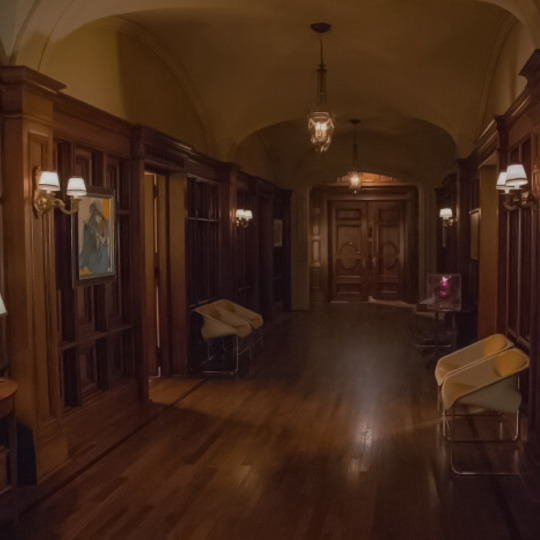
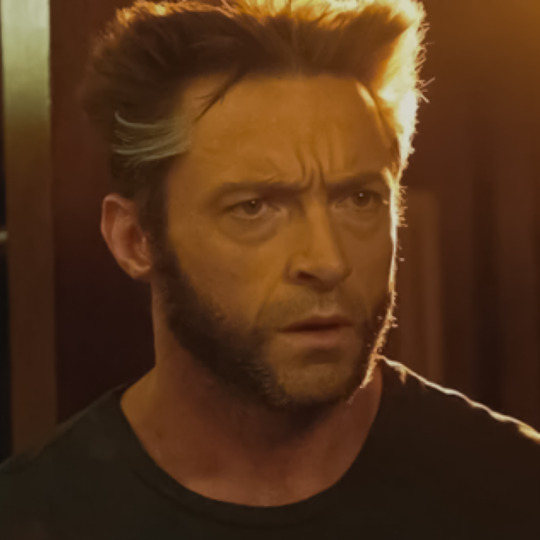


Xavier shows you a photo of the X-Men from their younger days.
professor logan howlett x professor fem!reader - married couple, cute, fluff, banter, no y/n used, no reader description, your an english professor, logan is a history professor
read on ao3 or find more parts for the series: here
divider credit: @enchanthings

Xavier’s office was usually a place for quick meetings, somewhere you and Logan visited only for mission briefings or occasional check-ins. But today, while waiting for the Professor, you found yourself lingering, letting your eyes wander over the collection of old, leather-bound books and the intricate wood detailing that gave the room a cozy, timeless charm. It felt like stepping into a library from another era, filled with the scent of aged paper and polished oak.
"Admiring the place?" Xavier's warm voice broke through your thoughts, and you turned to see him wheeling himself in with a small smile.
"Sorry, Professor," you said, slightly sheepish. "I didn’t mean to snoop."
He chuckled, waving a hand to dismiss your apology. "It’s quite all right. I must admit, it’s rare to have you in my office for longer than a moment."
You raised an eyebrow, curious. "What do you mean?"
Xavier’s smile grew, a fondness lighting up his face. "You’re a busy woman. And Logan… well, he seems rather determined to keep you occupied," he said with a soft laugh, his tone carrying a hint of mischief.
You laughed too, nodding. "He does have a habit of dragging me into all his projects. Says he’s teaching me ‘important skills,’" you replied, making air quotes with a smirk. "Last week it was ‘how to change the oil in a motorcycle,’ which turned out to be mostly him showing off while I handed him tools."
Xavier's expression softened, his eyes filled with a quiet pride. "You know," he began, his voice gentler now, "He was… rough around the edges when he first joined us. Lost, even. But you…" He paused, searching for the right words. "You’ve helped him find a part of himself he didn’t even realize he had."
A warmth blossomed in your chest at his words. "I think he’d say the same about all of you, Professor," you replied softly. "This place… the X-Men… you’re his family."
Xavier nodded, his gaze drifting to a framed photo on his desk. "We are, yes," he murmured, then reached over and picked up the frame, holding it out to you. "But it’s different now. I think you’ve made him realize he’s allowed to want more than that."
You took the frame, looking down at a photograph that seemed to capture a moment frozen in time. It was a group shot of the original X-Men—Jean, Scott, Ororo, Hank, and Xavier. They were all smiling, looking so much younger, full of energy and purpose. There, slightly to the side, arms crossed and brows furrowed was Logan. He looked much younger too, but even then, there was a touch of that familiar gruffness in his stance, a man who hadn’t quite found his place.
"He hasn’t changed much," you said softly, studying Logan’s face in the photo, taking in the wild hair and the faint scowl. "Still has that brooding intensity."
Xavier chuckled, his eyes twinkling with amusement. "Indeed. Though I think he’d deny it if anyone pointed it out."
You handed the photo back to Xavier, your heart full as you thought about the man Logan had become and the quiet way he had opened himself to you over time. "Thank you for showing me this, Professor."
"It was my pleasure," he said, his voice warm. "And thank you, truly, for making him the man he was always meant to be."
Later that evening, you found Logan in the kitchen, rummaging through the fridge with a half-hearted grumble about there never being enough beer. You leaned against the counter, watching him with a fond smile until he finally noticed and turned to look at you, one eyebrow raised.
"Why are you starin' at me like that?" he asked, his tone suspicious but amused.
You bit back a smirk, crossing your arms as you studied him, letting your gaze linger on the familiar lines of his face, his scruffy beard, the hair that always had a life of its own. "I was just thinking," you said, feigning an air of innocence. "Xavier showed me an old photo of the team today. You know, back when you all were young and fresh-faced."
Logan rolled his eyes, closing the fridge with a sigh. "Oh, here we go," he muttered, clearly bracing himself for whatever you were about to say.
"You had… quite the hairstyle," you teased, grinning. "Those wild sideburns, that brooding glare... Honestly, you looked like the cover of some 80s rock album. I half-expected to see a guitar slung over your shoulder."
He groaned, rubbing the back of his neck. "Yeah, yeah. Real funny, sweetheart," he grumbled, though you could see the faintest hint of a smile tugging at his lips. "Didn’t realize I was signin' up to be mocked for my ‘youthful looks’ when I married you."
You laughed, stepping closer and wrapping your arms around his waist. "Oh, I’m not complaining," you murmured, resting your head against his chest. "In fact, I think I would’ve fallen for you back then, too."
Logan raised an eyebrow, looking down at you with a skeptical smirk. "You? Fallin' for the cranky loner with bad hair? I don’t buy it."
You shrugged, meeting his gaze with a playful smile. "What can I say? I have a type," you teased. "Apparently, I’m a sucker for brooding, wild-haired men with a mysterious past."
He let out a soft chuckle, his arms wrapping around you as he pulled you closer. "Well, lucky for me, then," he murmured, leaning down to press a gentle kiss to your forehead. "Guess I did somethin' right if I managed to get you to stick around."
You looked up at him, your hand finding his cheek, your thumb brushing over the familiar lines of his face. "You’re everything I could’ve ever wanted, Logan," you said softly, your voice filled with warmth. "Sideburns and all."
He smiled, a rare, genuine smile that reached his eyes, and you felt his hand slip into yours, squeezing gently. "Love you, darlin’," he murmured, his voice a low rumble that sent a shiver down your spine.
#logan howlett#fluff#wolverine#x men logan#x men wolverine#logan howlett x you#logan x reader#marvel#hugh jackman#james logan howlett#professor logan#professor howlett#days of future past#logan howlett fluff#charles xavier#x men movies#x men#scott summers
196 notes
·
View notes
Text

A love story told through voicelines (Alhaitham ver.) IV
C/W: alhaitham x gn!reader, not that slow of a burn, characters find the other annoying, reader is a teacher at the akademiya, they have history (iykyk), angst no comfort, not proofread
Note: final part!
Part 3
—
(You) About Alhaitham: Other ways
Avoiding him is easier said than done.
I tell myself I’m just too busy—too caught up in work, too preoccupied to engage. But I know better. This isn’t about work. It’s about him. It’s about the way he looks at me, the way he always seems to be two steps ahead, the way I feel like I’m losing control of something I never meant to start in the first place.
So I take a different approach. I keep my responses short, my tone indifferent. I take the long way around Akademiya halls, conveniently slip out of rooms the moment he enters.
But knowing Alhaitham… I doubt he’ll let me go that easily.
(Alhaitham) About you: Other ways
Avoidance is a predictable tactic—one that requires effort. Which begs the question: why go through all that trouble for something they claim is insignificant? If they think distance will put an end to this, they clearly haven’t thought it through.
(You) About Alhaitham: Persistence
You would think he’d give up by now, but he hasn’t. I’m giving him a clear answer, aren’t I? He mentioned that if I found him insignificant or something, I would’ve gotten rid of him by now; so here I am—getting rid of him. Yet he still mingles around me like a fruit fly!
Do I really want him gone? Oh, of course I do! I could finally go back to minding my own business, and he can do the same. It’s for the best.
(Alhaitham) About you: Persistence
I do it for the sake of the experiment—which now includes a new variable: me. As unbecoming as it may seem, I find myself affected by their behavior. I still haven’t found a solid reason for that—why they’re avoiding me; but I have found a senseless supposition why my emotions are influenced by it.
According to Kaveh, my attention has been titled in their direction lately, and he teased that I had feelings for them. How ridiculous.
This is an experiment—analyzing their reactions, testing their limits. And yet… their absence is noticeable. Their avoidance, intentional.
If I didn’t care, I wouldn’t be thinking about it. If they truly wanted distance, they would’ve said so instead of running around all day trying hard to keep me at arm’s length.
Hmph. I’ll adjust my approach. See how long they can keep running.
(You) About Alhaitham: Honest opinions
We have a history that I partly regret. If I could do it all over again… I don’t know if I would. It was a good experience, but if that’s the reason why he keeps pursuing me, I would have to decline. I have so much to lose now—my job, my peers’ respect, my dignity. I’m not the same person I was back then. I’ve grown, changed, become more cautious. And yet, every time I think I have it all under control, he does something that rattles me. A look, a comment, a gesture that makes it impossible to forget the past—and somehow pulls me back into something I thought I’d left behind.
I’m not sure if I can trust him. He’s too calculating, too deliberate in his actions. I can’t tell if he’s genuinely interested or just trying to prove a point. Either way, I know better than to fall for whatever game he’s playing.
(Alhaitham) About you: Honest opinions
They occupy more of my thoughts than I care to admit. Not in any sentimental way, of course. It’s simply that their behavior is… intriguing. Inconsistent. At odds with the image they project. They claim disinterest, yet every reaction—every calculated silence or clipped remark—suggests otherwise.
And perhaps what unsettles me most is how easily they affect me. I’ve never cared to seek out another’s company. Yet I’ve found myself adjusting my schedule, taking detours through certain halls, lingering in conversations just a little longer. All for what? To observe? To test a theory?
Kaveh seems to think this is “obvious”—that I’m interested. Emotionally. Romantically. Irrational. I dismissed him, of course… but the thought stayed with me longer than it should have.
If this were truly about research, I wouldn’t feel this frustration when they avoid me. I wouldn’t notice the absence in the room before I even look.
…No, this isn’t research anymore.
But I haven’t decided what it is either.
(You) Character story: What can’t become
After classes, the Akademiya courtyard shimmered under the late afternoon sun, golden light bleeding over the marble and spilling between the arches. Laughter echoed in faint bursts, students scattering in clumps—papers in hand, minds half-elsewhere. You slipped past the gates with quick, practiced steps, hoping to disappear before—
“Hey… hey!”
You flinched.
His voice was unmistakable—calm yet commanding, always too close even when it came from behind.
“You know,” Alhaitham called out, “avoiding me won’t make this situation any easier. It won’t resolve anything either.”
You stopped halfway down the steps and turned, arms folding instinctively across your chest. “Really?” The word left your mouth sharper than you intended—more telling. “And what is this ‘situation’ exactly?”
Alhaitham closed the distance between you with his usual measured ease, his gaze steady, unreadable. “Don’t pretend you don’t know,” he said. “I’ve seen the way you react—even the slightest brush of our shoulders. The way your eyes brighten with every snarky remark we exchange—”
You rolled your eyes, the gesture sharp enough to cut the tension for half a breath. You turned again, walking off, heart pounding faster than your feet would allow.
He followed, undeterred. Of course he did.
“You’re only delaying what we both know is bound to happen.”
You spun around before he could take another step, breath pushing past your lips in a rush of frustration. “‘Both,’ ‘our,’ ‘us’—Archons above, Alhaitham! What even are we?! You talk about us like we’re some academic constant—as if you already solved the equation, and I’m just catching up. But I don’t even know what this is! What you want.”
You paused, the next words freezing on your tongue. You would not—could not—bring up that night. Not now. Not when the memory of his breath ghosting against your skin still lingered like a sunburn you couldn’t soothe.
His voice came softer this time. “I’ve never claimed to be simple,” he said. “But I’ve never lied either. You felt it too, didn’t you?”
Your stomach twisted.
You hated how easy it was for his words to find the sore parts of you. You hated even more how much truth you found in them.
“That’s exactly the problem,” you said, voice quieter now, raw at the edges. “You know what you’re doing—how easily you get under my skin. You corner me in crowded halls, you leave me thinking about words you didn’t even say… and then you walk off like none of it matters.”
He stayed silent. That silence—never awkward with him—was somehow worse than any rebuttal.
You took a breath, letting your shoulders fall slightly. “And the Akademiya?” you continued. “They see it—the glances, the whispers. Even the other professors have started asking questions.”
Alhaitham frowned, a faint crease between his brows. “That’s absurd—”
“Maybe for you,” you cut in, “but for me, perception is everything. I don’t have your title or your immunity. One wrong assumption, and I’m no longer the professor who earned their place—I’m just a rumor with a name.”
The weight of it all settled between you—words spoken not in anger, but necessity. The breeze passed again, brushing between you like a boundary neither of you could step over.
Alhaitham looked at you then—not with irritation, not even disappointment, but something quieter. Contained. Perhaps even regret.
“…Then what do you want me to do?” he asked, voice barely above the breeze. “Pretend none of it was real? That I didn’t feel something when I looked at you?”
You closed your eyes for a moment, forcing the ache back down. His words lodged themselves deeper than you wanted them to.
“I want you to understand,” you said, carefully. “This isn’t about what I feel. It’s about what I have to protect.”
A pause. You looked up and met his eyes—clear, unwavering, resolved.
“I can’t risk everything for something that might not survive the scrutiny. My reputation, my work… I’ve fought too hard to be seen for my mind, not whispered about for who I might be seen with. Even if that someone is you.”
For the first time, Alhaitham looked away. His jaw tightened slightly. The silence between you wasn’t cruel—it simply was. Like gravity or time. Unforgiving, but fair.
He nodded once. No protest. No plea. Just a flicker of something behind his eyes—acknowledgement, perhaps. Or acceptance.
“I won’t stand in your way,” he said. “Not now. Not ever.”
You let out a breath that trembled at the edges, the ache blooming somewhere deep beneath your ribs.
“…Thank you,” you said, voice steady at last. “For not making it harder than it already is.”
You turned before he could say anything else. The sun dipped beneath the buildings as you walked away, shadows spilling across the marble in your wake. Behind you, Alhaitham stayed where he was—still, composed, watching.
He didn’t call after you.
Not this time.
(Alhaitham) Character story: What won’t become
Alhaitham had never been fond of hypotheticals.
They were inefficient—rooted in speculation, mired in abstraction. What-ifs served little use in the real world, where causality and consequence reigned. A scholar deals in truth, not fantasy.
And yet, lately, he found himself entertaining one particular what-if more than he’d like to admit.
What if they hadn’t walked away?
He can still recall the look in their eyes—clear, unflinching, and devastatingly resolute. They had chosen themselves. And Alhaitham, for all his conviction, could do nothing but step aside.
Perhaps that’s why he respected them so deeply.
They were precise in their logic, unwavering in their principles. Not unlike him. But where he wielded detachment as armor, they wielded choice. They understood sacrifice—and made it anyway.
He remembers their words as clearly as any scholarly quote.
“This isn’t about what I feel. It’s about what I have to protect.”
There had been no malice in their voice, only truth. It was never a question of affection—of course they had felt it. That tension, the friction of minds colliding like flint, the conversations that lingered long after the echo faded. No one else challenged him quite like they did. No one else made silence feel that loud.
Still, affection alone was never going to be enough. Not when the Akademiya, with all its scrutiny and hierarchy, watched them more closely than it ever watched him.
They were right.
He was the Scribe. Acting Grand Sage, even. He could afford to be indifferent to perception. But they? A young professor, barely past their appointment, climbing uphill in a world built to doubt them.
Their choice made sense.
And so, he said nothing. Didn’t argue. Didn’t ask them to stay. What good would persuasion do, when they had already done the calculus themselves?
Alhaitham never believed in fate. But he believed in outcomes—inevitable, weighted, measurable. And this? This was an outcome both of them saw coming from the moment things began to blur.
He still sees them sometimes. In lectures. Passing through the colonnades. Sitting alone in the House of Daena, pen tapping lightly against a page. The world spins as it always does.
They do not look away.
Neither does he.
And that is the truth of what won’t become: not a tragedy, not a regret.
Just a possibility… acknowledged and left behind.
(You) About Alhaitham II
He never asked me to stay, and I suppose I should thank him for that. It made walking away cleaner—easier, even. But sometimes I wonder… if he had just said one thing differently. If I had turned back just once…
Still, I made my choice. And I’ll live with it, even if part of me still hears his voice when the halls go quiet.
(Alhaitham) About you II
They made the right choice. Personal feelings should never outweigh one’s principles—especially in a place like the Akademiya. I respect that… deeply. Though, if I find myself walking a little slower near their classes… it’s purely coincidental. Obviously.
Or so I keep telling myself.
—the end—
#genshin impact#genshin x reader#genshin fanfic#genshin impact x reader#genshin angst#alhaitham angst#alhaitham x reader
98 notes
·
View notes
Text
Jews are indigenous to Israel. Period.
Today is a good day to remind the Islamists and their supporters that Jews are from Judea (Israel) and the Islamists are the invaders and occupiers, not the other way around.
In 70 CE, Romans destroyed the Jewish temple and attempted to banish the Jews from Jerusalem. Simply because the Jews would not go silently into the night, dared fight back, and attempted to thwart the most technologically advanced army the world knew at that time.
We Jews commemorate this Roman invasion and colonization, by observing the Tisha B'Av annual fast.
This proof of Jewish indigeneity is literally carved in archaeological artifacts and in this case, carved in stone, depicted the Frieze on the Arch of Titus in Rome. This arch depicts Roman soldiers carrying the relics and loot, stolen from the Jewish temple. Look at the Menorah. Jews still use the same candlesticks and symbols.
So what is "Palestine"? Roman Emperor Hadrian renamed the land (Judea) to "Palestine", to attempt erasure of any connection with the Jews.
Muslim identity and religion was created more than 500 years later (in 600 CE). And Muslims started calling themselves "Palestinians" only much much later.
There is absolutely no way to twist history so that Palestinians appear before Jews. But it doesn't stop some people from trying...
Does indigeneity matter? Do Native Americans deserve their own land, or that might makes right, and European colonizers should be allowed to displace them? Native Americans have 56.2 million acres of land, governed by Native American Tribal nations that own them. This colored to about 4.8 million acres of land administered by Israel.
If you do not believe that indigeneity matters, if you believe who co where'd last is what counts, then guess what? We still arrive at the same place.

#israel#secular-jew#jewish#judaism#israeli#jerusalem#diaspora#secular jew#secularjew#islam#tisha b'av#indigenous#indigeneity#judea#Samaria#jexit#never again#no ceasefire#walkaway#hamas#gaza#antisemitism#islamism#islamic jihad#hamas is isis
249 notes
·
View notes
Text
LAST GIRL STANDING - ii.



previous part
pairings: wanda maximoff x fem!reader, agatha harkness x fem!reader, rio vidal x fem!reader
summary: you’ve come to learn that you can love more than one person—because you love them in different ways. the problem: they love you in one way. so, who are you in love with and who gets hurt?
warnings: minor cursing.
a/n: apologies for taking so long for an update. my job is about 10+ hours for four days and on my off days i'm working on set designs so i'm usually sleeping when i get the chance. please go back and reread the first part of this series as i had revised and edited parts of it while adding more to it. I will be adding a taglist soon, if you wish to for me to add you, let me know! with that, enjoy!
You headed to the library, your mind still racing with the remnants of your conversation with Wanda from last night. You had a few hours before your film history class started, and you needed time to clear your head before facing Agatha, the insanely attractive TA, who had unknowingly occupied a corner of your heart for the past semester. You didn’t really know Agatha well enough (or at all) to say much about her, aside from the occasional conversation about coursework. Yet, you had spent countless hours thinking about her, imagining what it would be like to know her beyond the confines of the classroom.
There was a familiarity to her presence that was both reassuring and nerve-wracking. The few times you’d spoken outside of lectures never seemed to work in your favor. You were unable to get more than two words out before something catastrophic occurred like spilling coffee on yourself, stepping in a pile of dog shit, and maybe tripping over a tree branch into a pit of mud(you are not god's favorite).
You'd scurry away before Agatha could do anything. In fact, you'd just barely hear a quiet but polite, "Goodbye?" You only glance over your shoulder when you were far enough away, seeing the outline of her body still in the same place but with her stare directly at you.
Getting lost in your thoughts, you don’t notice the presence of another leaning over the table and whispering, “Careful, y/n. If you think any harder, you might accidentally unlock the secrets of the universe.”
You blink, glancing up and see Wanda. “Or I might just discover where all my missing socks go. That’s probably a more realistic goal.”
The redhead giggles, pulling out the chair next to you and sits. “Hey, I��d argue that’s an even bigger mystery. You’d probably get a Nobel Prize for solving that one.”
“I fear that will only end with me having more mismatched socks and even more questions. And maybe a headache.”
Wanda smiles, tilting her head to the side as she always does when you humor her. You can’t help the warmth of blush creep up on your cheeks and ears. It was a habit when you had that type of attention from her. It was never necessarily a bad thing. More so, weird because you don’t completely understand it. You do, yet you don’t at least.
You continue to watch the way she falls into a fit of giggles as she scrunches up her nose and leans forward, causing her hair to cascade over her shoulders. There was always elegance surrounding Wanda. Wherever her presence was, it followed.
You are never one to deny how objectively gorgeous the shorter girl is, but there’s more to her than just physical features. More to Wanda than what you and everyone else around her knew, though, her soul radiates an amplified aspect of exactly how natural her beauty is. What you may not know, may be the one thing that fuels it all.
“So, what’s got you in a deep thought?” You hear her ask.
“The fact that we as humans grow limbs. We start off as an egg and then we grow. We grow arms, legs, fat, eyeballs, bones. Everything. We do that. We start as nothing and then boom! We have these…” you frail your arms around in front and Wanda has to cover her mouth to keep from laughing out loud.
“How about we go get some snacks before you head to class? I hear thinking causes hunger and existential crisis.”
You smile, nodding your head. “I think you need to start reading again. All those romcoms are getting to you.”
And so what if you’re are going through a form of crisis? Wanda is here. It may not be as easy as flipping a switch, but her presence is enough for you to feel 2% of sanity.
-
Today is no different. You stayed after class, lingering just long enough to ask Agatha a question about the upcoming exam, hoping it might lead to a longer conversation.
“Do you have any suggestions for additional reading?” you asked, trying to sound casual.
Agatha looked up from the papers she was grading, her expression thoughtful. “There’s a great essay on sexuality and gender within horror films if you’re interested in some extra insight. I can send you the link if you’d like.”
“That would be great,” you replied, and for a moment, your eyes met in a way that made your heart skip a beat.
But then, just like that, she turned back to grading, and the moment was gone. It was always like this—brief glimpses of something deeper, but never enough to grasp. You couldn’t tell if you were reading too much into it, or if there really was a chance that Agatha saw you as more than just another student.
It really shouldn’t be much of a shock to you. The two of you are nothing more than just a student and a teacher assistant. You aren’t friends. She has no need to delve into her personal life with you.
While Agatha has checked out from the conversation, you hadn’t. There’s more that you want to say. Though, the longer you stand frozen in place, the longer the moment has passed. It would be weird to say anything else now.
“Have a good day,” you bid. While leaving the classroom, you tried to shake off the disappointment that seemed to linger, refusing to be ignored. It had been easier when you could write off your feelings for Agatha as a simple crush, a harmless admiration for someone who probably didn’t know you existed beyond the realm of academia.
You weren't sure what you wanted from her, exactly. A part of you longed for more than the polite interactions, yet another part feared what would happen if that boundary was ever crossed. The uncertainty gnawed at you, and you found yourself second-guessing if you should do anything.
“If you would hold for a minute, L/N!”
“No.”
You’re halfway out the building when he steps in your line of vision. You grip onto the strap of your bag, clutching it close. Must he always act like you two are buds?
Vision chuckles, stopping in front of you and a bit too close than usual. Then again, he’s never been good with boundaries or personal space. He’s like a parasite. Constantly attaching himself to someone and sucking the life out of them if it benefits him, he happens to have a talent of hiding it well enough for it not to be noticed.
While you have negative emotions towards the man, you don’t entirely resent him in ways you wish you did. So what if he does forget about the dinner plans that you spend hours on for him to impress Wanda? Or gets too annoyed for how much time she spends with you (ya know the person who walked in diapers with her)? Or when Wanda mentions that she doesn’t need riches, she only needs sincerity and he gifts her a new car?
Okay, maybe he’s got one too many poor attributes to his character, however, there are aspects that make him not inherently the douchebag you desperately want him to be.
Like—“You are rather a chirpy one, aren’t you?”
You stare at him with no amusement written on your face. “My interests lies anywhere but you.”
He shares the ‘boy next door’ charm of a smile, shoving his hand in his pocket, and kicks the toe of your shoe. “I am here to request a favor,” he starts, “I have upset Wanda by overstepping her boundaries. Before speaking your mind, I have apologized to her this morning—“
“—what is your favor?” You asked annoyed.
“I wish to give Wanda a formal apology. Do you recall when she and I were to attend that music festival a couple years back and then we were unable to for unforeseen circumstances?”
You nodded your head, motioning him to continue on.
“Well, I remember you had mentioned that you knew one of the bands performing because you have a friend apart of it. I just-Wanda was and still is a massive fan. You know our 3 year anniversary is coming up-“
“—you can’t buy tickets?” You snickered.
You could tell he was getting slightly irritated by your interruptions. Good. He should for disrupting your semi-peaceful state of mind.
“Forget it. You’re such a nuisance.” He huffs, walking off and all you can do is give him a wave.
You knew what he was going to ask and you weren’t sure if you would have said yes to it or not..
#agatha all along#agatha harkness#witches#rio vidal#wandavision#wanda maximoff#agatha x rio#agathario#rio vidal x reader#agatha harkness x reader#wanda maximoff x reader#disney+#marvel#fanfic#wanda x agatha x rio x reader
156 notes
·
View notes
Text
Broken Pieces
Pairing: Logan Howlett x F!reader (20 ish something)
Genre: angst and angst
Warning: age gap, not proofread, use of Y/N
Summary: You got a crush on Logan while he is still overshadowed by Jean's death. The love journey between you two gets on a bumpy path.
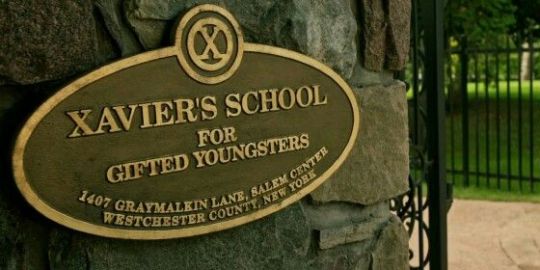
Xavier school has been busy because of the new entrances. Young, hopeless mutant which Professor X found out through Cerebro. The teachers feel a bit overwhelmed by them. It is kinda hard to control the youngsters to face their fear. Fear of losing control. Ororo, Raven, Hank, Logan, and Professor put so much effort changing the youngsters mindset. Saturday night feels a bit lay low now, the students are partying in Xavier's backyard, including you. The only class five mutant student in the school. telekinesis, energy manipulation, and some form of neuroelectronic interfacing power
all united in the body of an 18 year old girl. 4 years ago Professor accompanied by storm came to your house offering a safe place, you'd call your second home now. What about the parents? they still visit you once in a while. At the beginning you thought they were the one who called Professor to take you out but turned out wrong. Charles who's the one tracked you. They never abandoned their little girl, the reason why your mom and dad let you go is for the reason that you will be able to accept your gifts and harness it for the better use like X-Men did. So here you are now. Being an exemplary student after 4 years of practicing in this gifted school.
Logan is one of your favorite teachers. He teaches history. You two share quite strong bonding whether in usual or defense class. Always has his eye on you, protecting you even though he knows it's just a practice. That's how you develop a crush on him since last year. After Jean's death, Logan has been a different man, he mourns for almost 6 months fully. But when he was told to teach history to fill his days by the professor he got better. That's the moment he met you.
The party is almost done, several of your friends went back to the dorm already. You and Gina and Hector are left behind. Enjoying each other's company till almost midnight.
When you got back to your room, you saw logan and Ororo chatting in the living room. They didn't hear you coming, you were about to say hi but it stopped your intention when you heard Miss Grey's name in the conversation.
“So how you feeling logan?” ororo asked
“Great, the kids are quite a handful but i always manage it i always do”
“No, not the kids. I mean jean. Still dreamed of her?”
“O-oh yeah still the same. It's always about the wars and her, every night”
“You have to move on logan. That was not your fault. Try to make peace with it. I hate to see my friend suffer” she sighed
“It is what it is storm. At least I get occupied with the kids. Leave me struggling just at night” he answered while sipping the beer
You were still there, knowing it was wrong to eavesdrop on your teacher's conversation. That's all because of Logan, your curiosity increases when it comes to him.
“I see you close with Y/N. You two seem to share a special moment in every class you taught. Would you tell me about that?”
“Y/N?” he chuckle, “Nah she's a sweet kid but I just care for her as a student”
“Maybe caring for someone can mean something logan. You act differently around her I can see that. Smile more often. She able to dissipate your scowl face instantly and the school is not against it let me tell you”
Little did you know,you smile hearing her chatter
“No storm, she wasn't even near to Jean” logan almost snapped and bowed his head in frustration.
You've heard it all. Heart breaks into pieces knowing he doesn't feel anything for you after all he does the whole damn year. Feeling you shouldn't be there since the beginning, you stupidly stepped back, hand hitting the vase on the table near you. The vase breaks into pieces resembling how your heart feels right now. Logan and Storm are taken aback with what happened. You ran fast but carefully to your room, hoping they would not see you in the first place.
“What was that?” logan asked
“I don't know. No one's here. The hall is empty too” while looking around
“Maybe the pets did it” she adds
“Yeah maybe. Let's just clear this up” was the last thing you heard from your room.
Crying silently, you want to stop but you just can't. There's agony and rage inside of you.
“Why you feel hurt Y/N? Why? he's just try to be a good teacher, nothing more. Accept it, accept it you stupid pathetic girl. You're not Miss Jean Grey” talking to yourself like a lunatic.
The crying is getting uncontrollable. You become bad at controlling your power if you were filled with so much negative energy but forcing the dark power inside to not come out is hard. You don't want to wake everyone up. So, you decide to go to the backyard in a hurry. Near the lake u keep trying to hold it all but your body can't lie. Your face is numb, can't feel anything. Body floating in the air and is circled by the red light which is your power. You were struggling, and couldn't catch a breath.
Professor woken up by the energy of yours. He awakened all the teachers and told them to go to your room but you're not there. All of them went directly to the backyard but they found nothing, you were drowning in the lake at that moment. Logan saw a vague red light from the water. He knew it was you, he jumped into the water to save you.
You are all wet and unconscious. Storm doing CPR so that the water you swallowed spat out. You woke up for a moment and saw everyone.
“Jesus kid, are you okay?” he asked, full of worry in his voice.
“I'm s-sorry i…” said you faintly
Before you could continue you ran out of energy and blacked out. They finally bring you to the lab. Logan was the one carrying you there without you realizing it.
I will make several part of this story. I've rarely seen angst for Logan, so I try to write it myself. Let me know your thoughts about this. Hope you guys enjoy it!
#hugh jackman#logan howlett#james logan howlett#logan x reader#logan fanfiction#wolverine#logan angst#logan x you#x men#deadpool and wolverine#logan howlett imagine#logan howlett x you#logan howlett x reader#james howlett#wolverine x reader#logan howlett fanfiction#wolverine fanfiction
224 notes
·
View notes
Text
AU | SY Transmigrates as Someone Else | WQW Edition
ヾ(*’O’*)/~
In this world, when attempting to transfer SY into SQQ, the system glitches.
This glitch happens as the ‘SQQ villain’ role is still occupied, meaning SQQ would have still been present in his body, probably being able to counteract/treat the Qi deviation when it started, as he had some magical herb or another that he had on him due to his previous occurrences and history of bad deviations, so he survives.
SY is just there in the system’s waiting room, watching this screen and text glitch out.
He questions this malfunctioning system on wtf it wants him to do /who he would have become, cause come on, obviously he was gonna be isekai’ed and has suspicions on where he would be going as of what he was going off about and the voices he heard before he expired.
He chooses to shelve his panic and grief for later when he has time to process and mourn once he removes himself from whatever the fuck this situation is, cause like duh, he is dead he’ll never see his family againohmygod-
Anyways, he finds out that he would have been placed in SQQ’s body and nope what the hell do you want me to die?!?! and tries to see if he could be anyone else, ‘cause like come on, it’s PIDW!
He wants to at least be able to see all the cool flora and fauna if he has no choice of what world he will be living in, and although living as a woman may mean he gets to live longer, there is the threat of the heavenly pillar and the sudden transition of living as a man to a woman would be just too jarring.
So! After the system sorta relents at seeing that this guy is giving it another way to operate as well as saving its ass from being taken to see its higher-ups, it gives a list of potential other people that he can become that sorta has similar power and potential to affect the plot as being SQQ would have granted, although never as much given SQQ’s natural predisposition.
SY gets given the choice of LQG, QQQ, The Old Palace Master, Gongyi Xiao, and a few others.
Given his desire of wanting to live a relatively alive existence, he forgoes the more plot-present characters, such as Gongyi Xiao and The Old Palace Master, as well as LQG (cause he does not want to get shanked by SQQ, please and thank you), and due to previous arguments and reasons, he forgoes QQQ.
He looks over the remaining names and sees WQW, a character that doesn’t actually appear or get mentioned much in PIDW, is known to be the peak lord of the sword-forging peak, has massive muscles and has literally, like, one line when LBH got sent over and picked up Zheng Yang.
Additionally, the guy owns that sword that can tell if someone is possessed, so he would only have to stay away from the thing if the system doesn’t ensure that he can’t be ousted as such.
With this, SY as WQW would be living his best life as this guy bc he can fly on his sword all day and stay away from the plot while planning his escape when Cang Qiong Mountain Sect sets alight!
So with his choice made, SY, now WQW, wakes up half-disorientated, his forearms aching and the sounds of crying children and concerned/panicked teenagers.
After he gets dragged to Qian Cao Peak, the still-glitching system gives him the rundown of the situation of how he entered his new body; apparently Original!WQW got caught up in trying to stop a disciple from experimenting with volatile sword materials and the forge blew up as he tried to do damage control after he got everyone out, gaining a head injury and leaving him with plausible temporary amnesia, in addition to a sort of broken/glitched OOC lock that gradually corrupts over time till it's gone due to the vague understanding of the guy.
SY|WQW [we’ll just call him WQW from now on] realised that he was placed in PIDW a few months before the disciple choosing where LBH officially enters the sect, gets picked, and then is abused by SQQ [future him problem!!!] and although he doesn’t want LBH to face all those injustices, the system will not let him take purposeful actions to change certain plot points in the face of system punishment.
After he is fully released from Qian Cao Peak, he is expected by both the sect and mandated by the system to attend the disciple choosing.
While watching the poor children climb the massive staircase and start digging their hole to the best of their ability in an attempt to become a part of the prestigious sect and change the course of their life which they would most likely wish they didn’t join when LBH sets this place on fire…and sees what he thinks is a smol fluffy girl who has the determination and a spark in her eye attempting to dig a massive hole meticulously to catch the eye of a peak lord.
He runs through each wife in LBH’s harem to see if he can match this cute jie-jie with, and can’t seem to match her.
Looking around, he takes note that the other peak lords are overlooking her, seemingly disinterested or glancing her over with slight disgust at her thoroughly worn-through but obviously meticulously cleaned-up/washed clothing.
His eyeing had caught the eye of a little girl, most likely NYY who stood next to who he could only assume to be SQQ. She asks SQQ something about having a new martial sibling, which draws the attention of both SQQ and LQG to the girl.
Obviously having changed something as now NYY is eyeing this girl instead of her future demon harem husband system don’t punish me, as well as placing this jie-jie in the lane of SQQ, who is eyeing her with an unnamed but obviously not good look cause this cute girl is in front of a lecherous man as well as in the sight of LQG who wow has such a womanly visage I'd have thought that he would be more gruff who is set to die off in a few years and is peak lord of a boyish and brutish peak which he doesn't think that such a pretty jie-jie should be on, there is only one thing he can do!
So, at the end of the day, he ends up picking this smol bean before these ppl can get their hands on her, as obviously she wasn’t accepted in the original PIDW and if she had lived would have most likely ended up as a harem member, cause no way would such a cute bean not grow up and not catch the eye of LBH!
Obviously he won't let her suffer such a fate or leave her in the hands of SQQ. This causes some of his martial siblings to side-eye him, as he has a history of choosing more well-built candidates and not skinny dirty runts that look like death-warmed-over.
This smol jie-jie has sparkles in her eyes as she gets called over by one of WQW’s runners, which light up more the closer she gets to her new to-be-Shuzin!!! HIM!
WQW feels proud of his choice and decides that that is enough of tempting fate and the system, so he turns to leave, promising himself to ensure this little jie-jie lives her best life away from the plot [and LBG and his harem] on his peak!
…not seeing the system glitching and erroring to hell and back, not able to punish him as it was not a purposeful choice and raging in its system space at the hell that its higher-ups would put it through.
All because SY|WQW didn’t take note of the child’s outerwear. :)
#svsss#shen yuan#shen qingqiu#mxtx#svsss au#svsss fanfiction#fanfiction#luo binghe#first ever attempt at a fic ever#shen yuan transmigrates as someone else#bingqiu#bingyuan#the system is so done with this man#the system is in troooouuublllee#oblivious shen yuan#SY as WQW#shen jiu#luo bingmei
211 notes
·
View notes
Note
do the qilik see themselves as a kind of bird? (and do the other races see them that way?) how does it affect how they interact with birds, and are any of their closer relatives still alive, the same way monkeys/apes are to us?
This comes down entirely to cultural variation, but qilik cultures squarely conceptualizing themselves As Birds is relatively rare (at least partially in the sense that peoples often imagine themselves as separate from other animals in general). At most (with some exceptions) it tends to involve dividing the world into different Types of creatures and placing themselves into a very broad 'feathered' category, but not in a way where it's like "I am the same kind of Thing as a sparrow". Most qilik would take the question of 'are you some kind of bird' in the same way the average human would take 'are you some kind of giant rabbit' (acknowledging 'there's some things in common I guess, but no' at best, being intensely insulted at worst).
This is intensified by the fact that qilik are very obviously distant from most other birds in the setting (and are materially evolutionary distant). There's two surviving 'bird' groups here, class Aves (all irl birds) and a different paravian class that qilik belong to (the clade is fictional). Qilik-like birds are MUCH rarer, having been largely outcompeted by aves birds over the course of history and only remaining where they have securely kept their cousins out of occupying their flightless niches. The majority are found in old and isolated island environments, and many of these have gone extinct with pressures from dispersal/settlement of various sophonts and the animals they brought with them. Some do occur in mainland areas, but few of these have a wide spread (many were actually driven to extinction in ecological competition with early qilik, they tend to be found in places where qilik never spread en-masse).
Those that DO live in proximity to other qilik-like birds will generally at least note the resemblance. This does not necessarily lend towards them considering themselves the Same Thing (for comparison, humans living in close proximity to other primates don't tend to conceptualize themselves As primates. The reverse is more common if anything (imagining other apes as a sort of wildman)). It also doesn't tend to have the same degree of uncanny factor that tends to develop around Our closest relatives, because no qilik relative alive today resembles them to that same degree. It's more like a human looking at a tamarin or a spider monkey, you can see that their faces look a good bit like ours and their hands are almost identical, but it's not like the 'I am looking at a thing that is shaped almost exactly like a human but Not' factor that chimps have.
Where a qilik culture considers themselves distinct from/above other animals, they tend to treat these qilik-like birds as 'its like if a qilik was a bird lol'. Where a qilik culture conceptualizes all animals as being their own peoples, these qilik-like birds tend to be conceptualized as 'little cousins' or the like.
There are at least Some tendencies for above-baseline focus on birds in qilik cultures. Stories that attempt to explain why qilik have wings but cannot fly are VERY common. Cultural origin stories involving descent from an animal (usually an animal being transformed, or an animal mating with a qilik) frequently involve this animal being a bird (these stories almost always describe the origin of a singular ethnic group as a means of differentiating themselves from neighbors, rather than the entire species). Dances that mimic the movements/courtship behavior of birds are very common across qilik cultures (whether it be for beauty, an act of veneration, an act that attempts to summon wild game, a display of masculinity, etc), as is vocal mimicry of birds having notable significance. The motif of qilik with bird wings as deities, spirits, monsters, demons, etc, is EXTREMELY common across cultures.
None of these things Aren't true of other animals though. If you did an exhaustive compendium of all animal cultural elements in all qilik societies, you'd actually find INSECTS having slightly more prominence than birds.
The only qilik groups I've established that self label As Birds are those in structurally (rather than incidentally) interspecies societies with caelin/delkhin. This is partly a matter of explaining/justifying their commonalities by placing themselves on a sort of bird spectrum (caelin have beaks and can fly, like most birds, but have 'fur' (pycnofibers) instead of (overt) feathers. Delkhin have 'fur' + can't fly, but have beaks like most birds. Qilik cannot fly but have feathers like most birds). This classification system is usually supplementary to origin stories that Explain this connection, often placing the three groups as the first birds to be created, or superior/lords among all birds.
(There are probably some groups that self-label as birds without this factor at play, I just haven't established them and this probably isn't that common).
EXONYMS for qilik by non-qilik groups tend to describe them as birds. The most common exonyms for qilik as a species tend to be things like 'bird people' 'birdfolk' 'talking birds' etc. It's also fairly common that some dehumanizing (for lack of a better word) rhetoric used By qilik for other qilik revolves around comparisons to certain kinds of birds (this tends to be more specific than just birds in General, usually species culturally viewed as vicious, lowly, stupid, etc).
61 notes
·
View notes
Note
Did you ever manage to wrap your head around Stan's position in the military? Because I'm getting a lot of mixed signals aha. Also, just love all of your dr stone posts, they fuel me :)
Yeah, my head is settled on: The author has absolutely no fuckin' clue how the US military works and aggressively did not care. Which is fine, really, because it's a fairly minor point in the series and there's lots of other stuff to care about (although I would also like to lodge a complaint about how Senku is apparently the president of the science club as a freshie, but again, the timelines of stuff happening here wildly makes no sense and they really should not have even tried).
But as an American, oh my God.
If we cared about realism, he would be in the Marines based on his dress uniform and frankly also based on the weird variety of skills he has because the Marines do and always have occupied a very weird place in the US military in which they are expected to be kind of a jack of all trades and they tend to have much higher standards and much smaller forces than the other branches.
And if he's a special ops Marine, then he would be a Marine Raider in MARSOC, and if he's a commander of a MARSOC squad, he would have to be a Captain, which is a commissioned officer rank which pretty much universally requires a 4-year college degree. He could theoretically be a higher rank but at his age that's already pushing into nonsense and also unlikely for him to be boots on the ground anymore, and he clearly is.
According to the fanbook, he enlisted in the Air Force (???????????????? THEN WHY IS HE WEARING---DRESS UNIFORMS ARE NOT INTERCHANGEABLE????) at 18, was selected for the "special forces" at 19 (that is not how anything works holy shit, getting any of the special forces in any of the US branches is really rigorous and difficult and requires a lot of training) and promoted as the youngest commander in history (yeah for fucking sure) of a special ops team at 21.
This is just not how anything works. If he's a commissioned officer, he would still be in college. Also I think the author might think the US has just one generic special forces squad from all the branches, when in fact each has their own. The Navy SEALs are not the Marine Raiders are not the Army Green Berets are not the Air Commandos.
*yells into a void about this*
So anyway, if we want to align this to realism, he's a Captain of a Marine Raider team.
If we want to not do that, he's...a commander of special forces after being promoted out of the Air Force because...he was...good with a gun, I guess, and now he gets to wear the Marine uniform???
*rubs temples*
I like the first. Because at some point I am just going to have to ignore the fact that canon doesn't make any sense after acknowledging that's what it is.
It is possible that the author/artist just associated "Marines" with "US Special Forces" because until the last couple decades they were sort of treated that way, because of, again, the weird place they hold in the US Military generally, to the point where my grandfather insisted all Marines were special forces (he was a Marine, go figure).
But that hasn't been true for a while and the Marine Raiders were formed well before Stan could have ever joined the military.
Okay, I think that...probably answers your question? I can talk about this for a while because I spent a long time looking this stuff up. Like probably 20-40 hours. Because Stan is a pretty gay anime boy with an 8 pack whom I latched onto and thus this happened.
Also I want him to be a Marine Raider because the Marine motto is "Semper Fidelis" or "Always Faithful" and the Marine Special Ops motto specifically is "Spiritus Invictus" or "Unconquerable Spirit" and I suspect that wasn't on purpose for the reasons listed above, but goddamn does that fit him perfectly.
Also the Raider creed fits him super perfectly if you sub country in there for Xeno.
Anyway, feel free to ask more questions about Stuff.
32 notes
·
View notes
Text
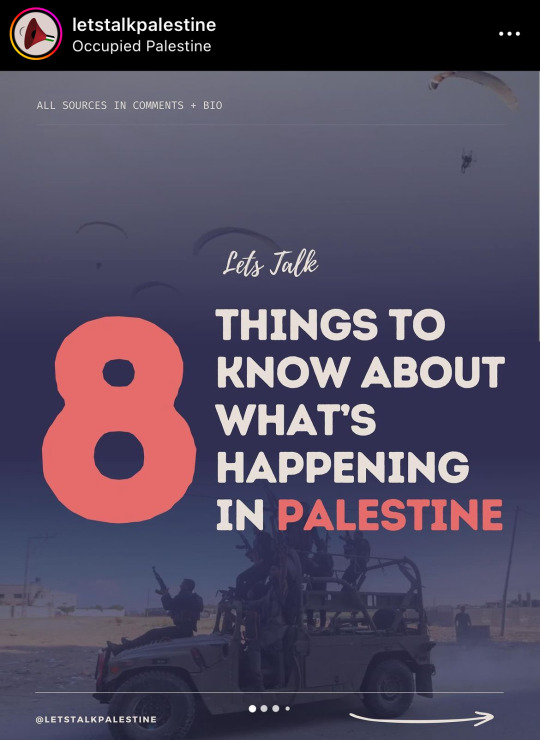
ID: Instagram post by @/letstalkpalestine. The slide reads: "Let's Talk: 8 things to know about what's happening in Palestine." End ID.
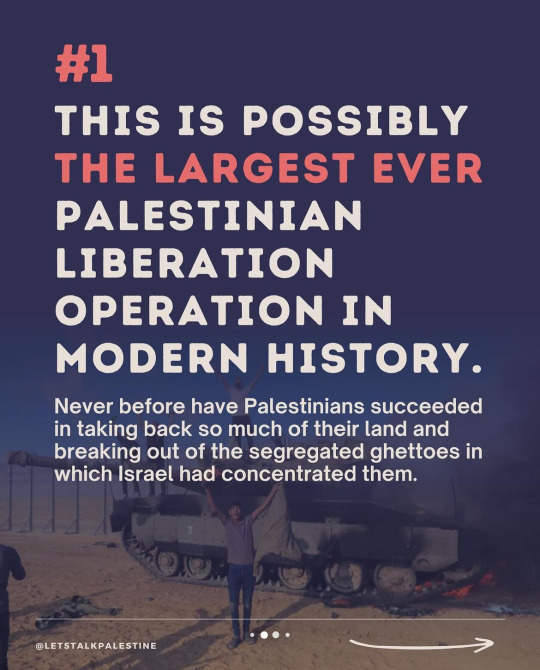
ID: "#1 This is possibly the largest ever Palestinian liberation operation in modern history. Never before have Palestinians succeeded in taking back so much of their land and breaking out of the segregated ghettoes in which Israel has concentrated them." End ID.

ID: "#2 This was an 'attack' [the word attack is striked through] response. Anyone would fight back after a decades-long process of colonization, after they have been turned into stateless refugees, expelled and concentrated in tiny ghettoes, imprisoned, or killed for daring to resist. For 15 years Israel has besieged Gaza with snipers stationed all around it, drones occupying its skies 24/7, and navy patrols shooting at any fishermen who venture too deep. If this happened to your city, wouldn't you fight back?" End ID.

ID: "#3 Palestinians didn't 'infiltrate israel." Most Gazans are not actually from Gaza. 70% of them are from the same surrounding lands they liberated yesterday morning." A map is shown of the area, overflowing with orange pins, with only a few red pins near the Mediterranean Sea. "Each orange pin is a Palestinian village that israel wiped out and ethnically cleansed. Most Gazans are from these places, fighting to return home." End ID.
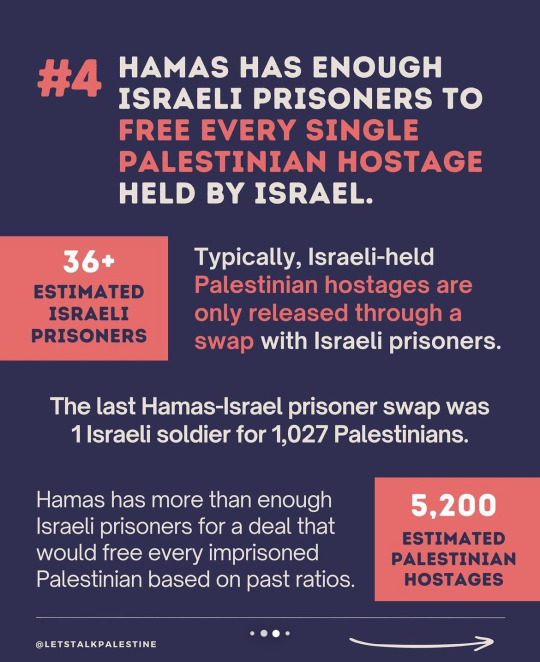
ID: "#4 Hamas has enough israeli prisoners to free every single Palestinian hostage held by israel. Typically, israeli-held Palestinian hostages are only released through a swap with israeli prisoners. The last Hamas-israel prisoner swap was 1 israeli soldier for 1,027 Palestinians. Hamas has more than enough israeli prisoners for a deal that would free every imprisoned Palestinian based on past ratios." Two boxes are shown on each side of the slide, one that reads, "36+ estimated israeli prisoners," and another that reads, "5,200 estimated Palestinian hostages." End ID.

ID: "#5 The Fall of the Gaza Wall In a historic moment already reshared millions of times online, Palestinian bulldozers have brought down parts of the israeli wall and fence that surrounds Gaza and traps in its residents. This comes as Palestinians have finally regained control of parts of the border, including the crossing in & out of Gaza. This is a historic achievement."
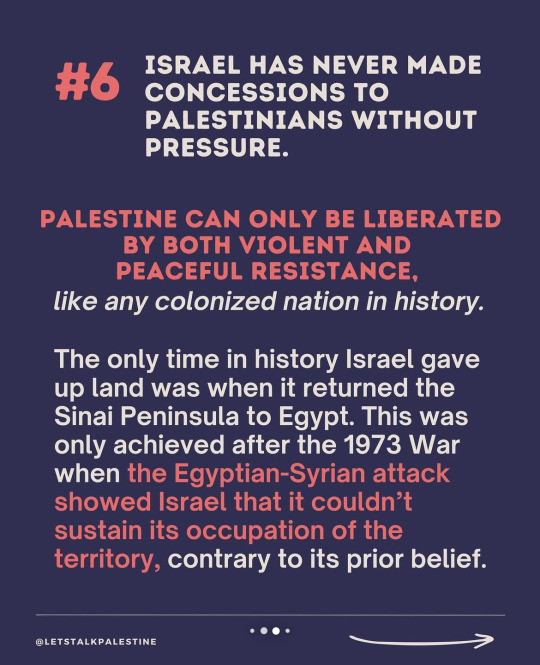
ID: #6 israel has never made concessions to Palestinians without pressure. Palestine can only be liberated by both violent and peaceful resistance, like any colonized nation in history. The only time in history israel gave up land was when it returned the Sinai Peninsula to Egypt. This was only achieved after the 1973 War when the Egyptian-Syrian attack showed israel that it couldn't sustain its occupation of the territory, contrary to its prior belief." End ID.
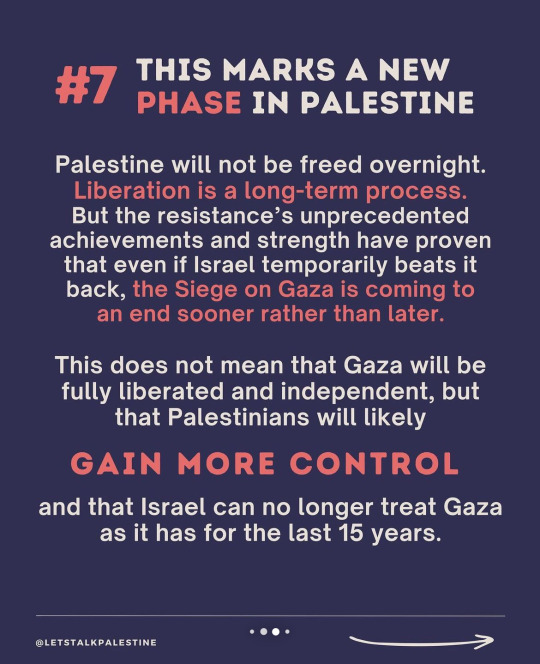
ID: #7 This marks a new phase in Palestine. Palestine will not be freed overnight. Liberation is a long-term process. But the resistance's unprecedented achievements and strength have proven that even if Israel temporarily beats it back, the Siege on Gaza is coming to an end sooner rather than later. This does not mean that Gaza will be fully liberated and independent, but that Palestinians will likely gain more control and that israel can no longer treat Gaza as it has for the last 15 years." End ID.

ID: #7 Continued. Beyond Gaza, israel will be deterred from escalating its occupation against Palestinians in places like Jerusalem. Hamas has conclusively proven the effectiveness of fight back against the occupation, in contrast to the diplomatic means of resistance which -- while still important -- on their own have proven to be futile in the face of israeli rejectionism. This will likely shake up the Palestinian political scene, as the Palestinian Authority, which collaborates with the israeli military and refuses to defend its people, will now face even more challenges to its rule." End ID.
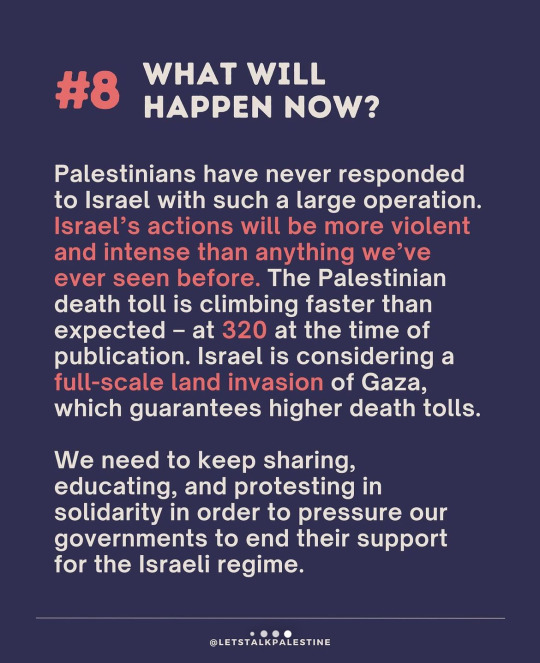
ID: “#8 What will happen now? Palestinians have never responded to israel with such a large operation. israel's actions will be more violent and intense than anything we've ever seen before. The Palestinian death toll is climbing faster than expected -- at 320 at the time of this publication. israel is considering a full-scale land invasion of Gaza, which guarantees higher death tolls. We need to keep sharing, educating and protesting in solidarity in order to pressure our governments to end their support for the israeli regime." End ID.
#reaux speaks#free palestine#instagram#palestine#israel#gaza#genocide#resistance#apartheid#hamas#liberation#history#occupation
471 notes
·
View notes
Text
one of my favorite parts of star wars is how luthen's antique shop and thrawn's collection are such amazing ways to show how the empire tries to historicize people and cultures and homogenize them under one imperial identity (which is how real life empires work). thrawn, an occupying force on ryloth, taking hera's kalikori and assuming he knows more about it than hera does herself. sculdun, buying back a piece of chandrila's history, but only for his own benefit. syril, buying spider toys on ghorman for no reason other than to feed the narrative. cultures and peoples across the galaxy who are now reduced to perfectly curated artifacts that tell perfectly sanitized stories because the people have been so severely crushed by the empire (at least in the eyes of the average person) that these people no longer have a history and culture outside of a museum despite the fact that they are still living and breathing and surviving. part of why luthen's antique shop works as a cover for so long because he's buying into the imperial narrative that places like naboo and ryloth are no longer distinct and deserving of their own stories outside of what a rich man on coruscant can convey them as.
and then there's the moments when people take those stories back. hera refusing to tell thrawn about her kalikori and eventually getting it back. sabine putting the darksaber back into the hands of mandalorians. ezra relying on the rich mythical history of lothal and the galaxy to save him and his people. the people of ferrix throwing their bricks at the empire. the people of ghorman only speaking ghor and proudly singing their anthem in their darkest hour. these are people, both chosen and ordinary, who resist this false historicization. they scream "we are still here, and we will fight back". they refuse to enter the homogenizing machine of the empire, and they stand as individuals. this kind of resistance that involves keeping history and culture alive is just as important, and while it's not emphasized as a main storyline as often, i do appreciate the little hints of it that we get.
#my inner student who studies culture and globalization needed a moment to apply it to star wars so here we are#i have no idea what to tag this as because i'm not tagging all these characters and planets but i'm gonna try anyway#star wars#star wars rebels#andor
31 notes
·
View notes